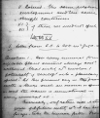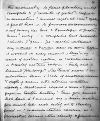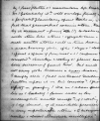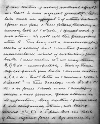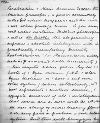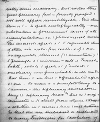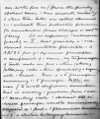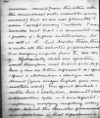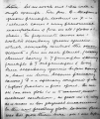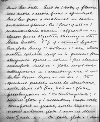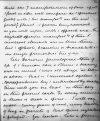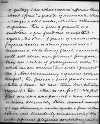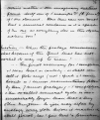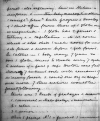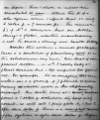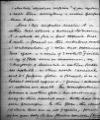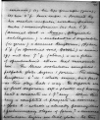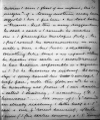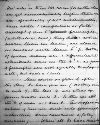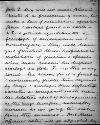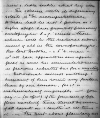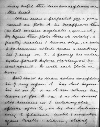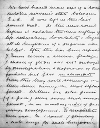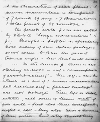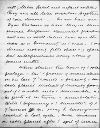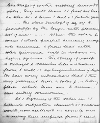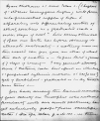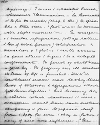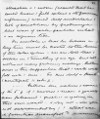Mahatma Letter No. 67
| Quick Facts | |
|---|---|
| People involved | |
| Written by: | Koot Hoomi |
| Received by: | A. O. Hume |
| Sent via: | unknown |
| Dates | |
| Written on: | unknown |
| Received on: | July 10, 1882 |
| Other dates: | unknown |
| Places | |
| Sent from: | unknown |
| Received at: | Simla, India |
| Via: | unknown |
This is Letter No. 67 in The Mahatma Letters to A. P. Sinnett, 4th chronological edition. It corresponds to Letter No. 15 in Barker numbering. See below for Context and background.
No color slides are available, but black-and-white images have been taken from microfilm.
< Prev letter chrono
Next letter chrono >
< Prev letter Barker
Next letter Barker >
Page 1 transcription, image, and notes
|
From K.H. to A.O.H. Received July 10th, 1882. (1) Does every mineral form, vegetable, plant, animal, always contain within it that entity which involves the potentiality of development into a planetary spirit? At this present day in this present earth is there such an essence or spirit or soul — the name is immaterial in every mineral, etc. (1) Invariably; only rather call it the germ of a future entity, which it has been for ages. Take the human foetus. From |
|
NOTES:
|
Page 2
|
the moment of its first planting until it completes its seventh month of gestation it repeats in miniature the mineral, vegetable, and animal cycles it passed through in its previous encasements, and only during the last two, develops its future human entity. It is completed but towards the child's seventh year. Yet it existed without any increase or decrease aeons on aeons before it worked its way onward, through and in the womb of mother nature as it works now in its earthly mother's bosom. Truly said a learned philosopher who trusts more to his intuitions than the dicta of modern science. "The stages of man's intra-uterine existence embody a condensed record of some of the missing pages in Earth's history." Thus you must look back at the animal, vegetable and mineral entities. You must take each entity at its starting point in the manvantaric course as the primordial cosmic atom already differentiated |
NOTES: |
Page 3
|
by the first flutter of the manvantaric life breath. For the potentiality which will develop finally in a perfected planetary spirit lurks in, is in fact that primordial cosmic atom. Drawn by its "chemical affinity" (?) to coalesce with other like atoms the aggregate sum of such united atoms will in time become a man-bearing globe after the stages of the cloud, the spiral and sphere of fire-mist and of the condensation, consolidation, shrinkage and cooling of the planet have been successively passed through. But mind, not every globe becomes a "man bearer." I simply state the fact without dwelling further upon it in this connection. The great difficulty in grasping the idea in the above process lies in the liability to form more or less incomplete mental conceptions of the working of the one element, of its inevitable presence in every imponderable atom, and its subsequent ceaseless and almost illimitable multiplication |
NOTES: |
Page 4
|
of new centres of activity without affecting in the least its own original quantity. Let us take such an aggregation of atoms destined to form our globe and then follow, throwing a cursory look at the whole, the special work of such atoms. We will call the primordial atom A. This being not a circumscribed centre of activity but the initial point of a manwantaric whirl of evolution, gives birth to new centres which we may term B, C, D, etc., incomputably. Each of these capital points gives birth to minor centres, a, b, c, etc. And the latter in the course of evolution and involution in time develops into A's, B's, C's, etc., and so form the roots or are the developing causes of new genera, species, classes, etc., ad infinitum. Now neither the primordial A and its companion atoms, nor their derived a's, b's, c's, have lost one tittle of their original force or life-essence by |
NOTES: |
Page 5
|
the evolution of their derivatives. The force there, is not transformed into something else as I have already shown in my letter, but with each development of a new centre of activity from within itself multiplies ad infinitum without ever losing a particle of its nature in quantity or quality. Yet acquiring as it progresses something plus in its differentiation. Thus "force" so-called shows itself truly indestructible but does not correlate and is not convertible in the sense accepted by the Fellows of the R.S., but rather may be said to grow and expand into "something else" while neither its own potentiality nor being are in the least affected by the transformation. Nor can it well be called force since the latter is but the attribute of Yin Sin (Yin Sin or the one "Form of existence" also Adi-Buddhi or Dharmakaya the mystic, universally diffused essence) |
NOTES:
|
Page 6
|
when manifesting in the phenomenal world of senses namely only your old acquaintance Fohat. See in this connexion Subba Row's article "Aryan Arhat Esoteric Doctrines" on the seven-fold principles in man; his review of your Fragments, pp. 94 and 95. The initiated Brahmin calls it (Yin Sin and Fohat) Brahman and Sakti when manifesting as that force. We will perhaps be nearer correct to call it infinite life and the source of all life visible and invisible, an essence inexhaustible ever present, in short Swabhavat. (S. in its universal application, Fohat when manifesting throughout our phenomenal world or rather the visible universe hence in its limitations). It is pravritti when active, nirvritti when passive. Call it the Sakti of Parabrahma, if you like, and say with the Adwaitees (Subba Row is one) that |
NOTES: |
Page 7
|
Parabrahm plus Maya becomes Iswar the creative principle — a power commonly called God which disappears and dies with the rest when pralaya comes. Or you may hold with the northern Buddhist philosophers and call it Adi-Buddhi the all-pervading supreme and absolute intelligence with its periodically manifesting Divinity — "Avalokiteshvara" (or Manwantaric intelligent nature crowned with humanity) — the mystic name given by us to the hosts of the Dyan Chohans (N.B., the solar Dyan Chohans or the host of only our solar system) taken collectively, which host represents the mother source, the aggregate amount of all the intelligences that were[,] are or ever will be whether on our string of man-bearing planets or on any part or portion of our solar system. And this will bring you by |
NOTES: |
Page 8
|
analogy to see that in its turn Adi-Buddhi (as its very name translated literally implies) is the aggregate intelligence of the universal intelligences including that of the Dyan Chohans even of the highest order. That is all I dare now to tell you on this special subject, as I fear I have already transcended the limit. Therefore whenever I speak of humanity without specifying it you must understand that I mean not humanity of our fourth round as we see it on this speck of mud in space but the whole host already evoluted. Yes as described in my letter — there is but one element and it is impossible to comprehend our system before a correct conception of it is firmly fixed in one's mind. You must therefore pardon me if I dwell on the subject longer than |
NOTES: |
Page 9
|
really seems necessary. But unless this great primary fact is firmly grasped the rest will appear unintelligible. This element then is the — to speak metaphysically — one sub-stratum or permanent cause of all manifestations in the phenomenal universe. The ancients speak of the five cognizable elements of ether, air, water, fire, earth, and of the one incognizable element (to the uninitiates) the 6th principle of the universe — call it Purush Sakti, while to speak of the seventh outside the sanctuary was punishable with death. But these five are but the differentiated aspects of the one. As man is a seven-fold being so is the universe — the septenary microcosm being to the septenary macrocosm but as the drop of rainwater is to the cloud from whence it dropped and whither in the course of time it will return. In that one are embraced or included so many tendencies for the evolution of |
NOTES: |
Page 10
|
air, water, fire, etc. (from the purely abstract down to their concrete condition) and when those latter are called elements it is to indicate their productive potentialities for numberless form changes or evolution of being. Let us represent the unknown quantity as X; that quantity is the one eternal immutable principle — and A, B, C, D, E, five of the six minor principles or components of the same; viz., the principles of earth, water, air, fire and ether (akasa) following the order of their spirituality and beginning with the lowest. There is a sixth principle answering to the sixth principle Buddhi, in man (to avoid confusion remember that in viewing the question from the side of the descending scale the abstract All or eternal principle would be numerically designated as the first, and the phenomenal universe as the seventh, and whether belonging to man or to the |
NOTES: |
Page 11
|
universe — viewed from the other side the numerical order would be exactly reversed) but we are not permitted to name it except among the initiates. I may however hint that it is connected with the process of the highest intellection. Let us call it N. And besides these, there is under all the activities of the phenomenal universe an energizing impulse from X, call this Y. Algebraically stated, our equation would therefore read A+B+C+D+E+N+Y=X. Each of these six letters represents, so to speak, the spirit or abstraction of what you call elements (your meagre English gives me no other word). This spirit controls the entire line of evolution, around the whole manwantaric cycle in its own department — the informing, vivifying, impelling, evolving cause, behind the countless phenomenal manifestations in that department of |
NOTES: |
Page 12
|
Nature. Let us work out the idea with a single example. Take fire. D — the primal igneous principle resident in X — is the ultimate cause of every phenomenal manifestation of fire on all the globes of the chain. The proximate causes are the evoluted secondary igneous agencies which severally control the seven descents of fire on each planet. (Every element having its seven principles and every principle its seven sub-principles and these secondary agencies before doing so, have in turn become primary causes.) D is a septenary compound of which the highest fraction is pure spirit. As we see it on our globe it is in its coarsest, most material condition, as gross in its way as is man in his physical encasement. In the next preceding globe to ours fire was less gross than here: on the one before |
NOTES: |
Page 13
|
that less still. And so the body of flame was more and more pure and spiritual less and less gross and material on each antecedent planet. On the first of all in the manwantaric chain, it appeared as an almost pure objective shining — the Maha Buddhi, sixth principle of the eternal light. Our globe being at the bottom of the arc where matter exhibits itself in its grossest form along with spirit — when the fire element manifests itself on the globe next succeeding ours in the ascending arc it will be less dense than as we see it. Its spiritual quality will be identical with that which fire had on the globe preceding ours in the descending scale; the second globe of the ascending scale will correspond in quality with that of the second anterior globe to ours in the descending scale, etc. On each globe of the chain |
NOTES: |
Page 14
|
there are seven manifestations of fire of which the first in order will compare as to spiritual quality with the last manifestation on the next preceding planet: the process being reversed, as you will infer, with the opposite arc. The myriad specific manifestations of these six universal elements are in their turn but the offshoots, branches or branchlets of the one single primordial "Tree of Life." Take Darwin's genealogical tree of life of the human race and others and bearing ever in mind the wise old adage, "As below so above" — that is the universal system of correspondences — try to understand by analogy. Thus will you see that in this day on this present earth in every mineral, etc., there is such a spirit. I will say more. Every grain of sand, every boulder or crag of granite, is that spirit crystallized or petrified. You hesitate. Take a primer |
NOTES: |
Page 15
|
of geology and see what science affirms there about the formation and growth of minerals. What is the origin of all the rocks, whether sedimentary or igneous. Take a piece of granite or sandstone and you find one composed of crystals, the other of grains of various stones (organic rocks or stones formed out of the remains of once living plants and animals, will not serve our present purpose: they are the relics of subsequent evolutions while we are concerned but with the primordial ones). Now sedimentary and igneous rocks are composed, the former of sand gravel and mud, the latter of lava. We have then but to trace the origin of the two. What do we find? We find that one was compounded of three elements or more accurately three several manifestations of the one element, — earth, water and fire, and that the other was similarly compounded (though under different physical conditions) out of |
NOTES: |
Page 16
|
cosmic matter — the imaginary materia prima itself one of the manifestations (6th principle) of the one element. How then can we doubt that a mineral contains in it a spark of the One as everything else in this objective nature does? (2) When the pralaya commences what becomes of the Spirit that has not worked its way up to man? (2) . . . The period necessary for the completion of the seven local or earthly — or shall we call it globe-rings (not to speak of the seven Rounds in the minor manwantaras followed by their seven minor pralayas) — the completion of the so-called mineral cycle is immeasurably longer than that of any other kingdom. As you may infer by analogy every globe before it reaches its adult period, has to pass through a formation |
NOTES: |
Page 17
|
period — also septenary. Law in Nature is uniform and the conception, formation, birth, progress and development of the child differs from those of the globe only in magnitude. The globe has two periods of teething and of capillature — its first rocks which it also sheds to make room for new — and its ferns and mosses before it gets forest. As the atoms in the body change [every] seven years so does the globe renew its strata every seven cycles. A section of a part of Cape Breton coalfields shows seven ancient soils with remains of as many forests, and could one dig as deep once more seven other sections would be found following. . . . There are three kinds of pralayas and manwantara: — 1. The universal or Maha pralaya and manwantara. 2. The solar pralaya and manwantara. 3. The minor pralaya and manwantara. When the pralaya No. 1 is finished the universal |
NOTES:
|
Page 18
|
manwantara begins. Then the whole universe must be re-evoluted de novo. When the pralaya of a solar system comes it affects that solar system only. A solar pralaya = 7 minor pralayas. The minor pralayas of No. 3 concern but one little string of globes, whether man-bearing or not. To such a string our Earth belongs. Besides this within a minor pralaya there is a condition of planetary rest or as the astronomers say "death," like that of our present moon — in which the rocky body of the planet survives but the life impulse has passed out. For example. Let us imagine that our earth is one of a group of seven planets or man-bearing worlds more or less eliptically arranged. Our earth being at the exact lower central point of the orbit of evolution, viz., half way round — we will call the first globe A, the last Z. After each solar pralaya there is a complete destruction of our system and after each solar p. begins |
NOTES:
|
Page 19
|
the absolute objective reformation of our system and each time everything is more perfect than before. Now the life impulse reaches "A" or rather that which is destined to become "A" and which so far is but cosmic dust. A centre is formed in the nebulous matter of the condensation of the solar dust disseminated through space and a series of three evolutions invisible to the eye of flesh occur in succession, viz., three kingdoms of elementals or nature forces are evoluted: in other words the animal soul of the future globe is formed; or as a Kabalist will express it, the gnomes, the salamanders, and the undines are created. The correspondence between a mother-globe and her child-man may be thus worked out. Both have their seven principles. In the Globe, the elementals (of which there are in all seven species) form (a) her gross body, (b) her fluidic double |
NOTES: |
Page 20
|
(linga sariram), (c) her life principle (jiva); (d) her fourth principle kama rupa is formed by her creative impulse working from centre to circumference; (e) her fifth principle (animal soul or Manas, physical intelligence) is embodied in the vegetable (in germ) and animal kingdoms; (f) her sixth principle (or spiritual soul, Buddhi) is man (g) and her seventh principle (atma) is in a film of spiritualized akasa that surrounds her. The three evolutions completed: palpable globe begins to form. The mineral kingdom fourth in the whole series, but first in this stage leads the way. Its deposits are at first vaporous soft and plastic, only becoming hard and concrete in the seventh ring. When this ring is completed it projects its essence to globe B — which is already passing through the preliminary stages of formation and mineral evolution begins on that globe. At this |
NOTES:
|
Page 21
|
juncture the evolution of the vegetable kingdom commences on globe A. When the latter has made its seventh ring its essence passes on to globe B. At that time the mineral essence moves to globe C and the germs of the animal kingdom enter A. When the animal has seven rings there, its life principle goes to globe B, and the essences of vegetable and mineral move on. Then comes man on A, an ethereal foreshadowing of the compact being he is destined to become on our earth. Evolving seven parent races with many offshoots of sub-races, he, like the preceding kingdoms completes his seven rings and is then transferred successively to each of the globes onward to Z. From the first man has all the seven principles included in him in germ but none are developed. If we compare him to a baby we will be right; no one has ever, in the thousands of ghost stories |
NOTES: |
Page 22
|
current, seen the ghost of an infant, though the imagination of a loving mother may have suggested to her the picture of her lost babe in dreams. And this is very suggestive. In each of the rounds he makes one of the principles develop fully. In the first round his consciousness on our earth is dim and but feeble and shadowy, something like that of an infant. When he reaches our earth in the second round he has become responsible in a degree, in the third he becomes so entirely. At every stage and every round his development keeps pace, with the globe on which he is. The descending arc from A to our earth is called the shadowy, the ascending to Z the "luminous" . . . We men of the fourth round are already reaching the latter half of the fifth race of our fourth round humanity, while the men (the few earlier comers) of the fifth round, |
NOTES: |
Page 23
|
though only in their first race (or rather class), are yet immeasurably higher than we are — spiritually if not intellectually; since with the completion or full development of their fifth principle (intellectual soul) they have come nearer than we have, are closer in contact with their sixth principle Buddhi. Of course many are the differentiated individuals even in the fourth r. as germs of principles are not equally developed in all, but such is the rule. . . . Man comes on globe "A" after the other kingdoms have gone on. (Dividing our kingdoms into seven, the last four are what exoteric science divides into three. To this we add the kingdom of man or the Deva kingdom. The respective entities of these we divide into germinal, instinctive, semi-conscious, and fully conscious). . . . When all kingdoms have reached |
NOTES: |
Page 24
|
globe Z they will not move forward to re-enter A in precedence of man, but under a law of retardation operative from the central point — or earth — to Z and which equilibrates a principle of acceleration in the descending arc — they will have just finished their respective evolution of genera and species, when man reaches his highest development on globe Z — in this or any round. The reason for it is found in the enormously greater time required by them to develop their infinite varieties as compared with man; the relative speed of development in the rings therefore naturally increases as we go up the scale from the mineral. But these different rates are so adjusted by |
NOTES: |
Page 25
|
man stopping longer in the inter-planetary spheres of rest, for weal or woe — that all kingdoms finish their work simultaneously on the planet Z. For example, on our globe we see the equilibrating law manifesting. From the first appearance of man whether speechless or not to his present one as a fourth and the coming fifth round being the structural intention of his organization has not radically changed. Ethnological characteristics however varied, affecting in no way man as a human being. The fossil of man or his skeleton whether of the period of that mammalian branch of which he forms the crown, whether cyclop or dwarf can be still recognised at a glance as a relic of man. Plants and animals meanwhile have become |
NOTES: |
Page 26
|
more and more unlike what they were. . . . The scheme with its septenary details would be incomprehensible to man had he not the power as the higher Adepts have proved of prematurely developing his 6th and 7th senses — those which will be the natural endowment of all in the corresponding rounds. Our Lord Buddha — a 6th r. man — would not have appeared in our epoch, great as were his accumulated merits in previous rebirths but for a mystery. . . . Individuals cannot outstrip the humanity of their round any further than by one remove, for it is mathematically impossible — you say (in effect): if the fountain of life flows ceaselessly there should be men of all rounds on the earth at all times, etc. The hint about planetary rest |
NOTES: |
Page 27
|
may dispel the misconceptions on this head. When man is perfected qua a given round on Globe A he disappears thence (as had certain vegetables and animals). By degrees this Globe loses its vitality and finally reaches the moon stage, i.e., death, and so remains while man is making his seven rings on Z and passing his intercyclic period before starting on his next round. So with each Globe in turn. And now as man when completing his seventh ring upon A has but begun his first on Z and as A dies when he leaves it for B, etc., and as he must also remain in the intercyclic sphere after Z, as he has between every two planets, until the impulse again thrills the chain, clearly |
NOTES:
|
Page 28
|
no one can be more than one round ahead of his kind. And Buddha only forms an exception by virtue of the mystery. We have fifth round men among us because we are in the latter half of our septenary earth ring. In the first half this could not have happened. The countless myriads of our fourth round humanity who have outrun us and completed their seven rings on Z, have had time to pass their intercyclic period begin their new round and work on to globe D (ours). But how can there be men of the 1st, 2nd, 3rd, 6th and 7th rounds? We represent the first three and the sixth can only come at rare intervals and prematurely like Buddhas (only under prepared conditions) and that the last-named the seventh are not yet evolved! |
NOTES: |
Page 29
|
We have traced man out of a round into the Nirvanic state between Z and A. A was left in the last round dead. As the new round begins it catches the new influx of life, reawakens to vitality and begets all its kingdoms of a superior order to the last. After this has been repeated seven times comes a minor pralaya; the chain of globes are not destroyed by disintegration and dispersion of their particles but pass in abscondito. From this they will re-emerge in their turn during the next septenary period. Within one solar period (of a p. & m.) occur seven such minor periods, in an ascending scale of progressive development. To recapitulate there are in the round seven planetary or earth rings for each kingdom |
NOTES:
|
Page 30
|
and one obscuration of each planet. The minor manwantara is composed of seven rounds, 49 rings and 7 obscurations, the solar period of 49 rounds, etc. The periods with pralaya and manwantara are called by Dikshita "Surya manwantaras and pralayas." Thought is baffled in speculating how many of our solar pralayas must come before the great Cosmic night — but that will come. . . . In the minor pralayas there is no starting de novo — only resumption of arrested activity. The vegetable and animal kingdoms which at the end of the minor manwantara had reached only a partial development are not destroyed. Their life or vital entities, call some of them nati if you will — find also their corresponding night and rest — they also have a Nirvana of their own. And why should they |
NOTES:
|
Page 31
|
not, these foetal and infant entities. They are all like ourselves begotten of the one element. . . . As we have our Dyan Chohans so have they in their several kingdoms elemental guardians and are as well taken care of in the mass as is humanity in the mass. The one element not only fills space and is space, but interpenetrates every atom of cosmic matter. When strikes the hour of the solar pralaya — though the process of man's advance on his last seventh round is precisely the same, each planet instead of merely passing out of the visible into the invisible as he quits it in turn is annihilated. With the beginning of the seventh Round of the seventh minor manwantara, every kingdom having now reached its last cycle, there remains on each planet after the exit of man |
NOTES: |
Page 32
|
but the maya of once living and existing forms. With every step he takes on the descending and ascending arcs as he moves on from Globe to Globe the planet left behind becomes an empty chrysaloidal case. At his departure there is an outflow from every kingdom of its entities. Waiting to pass into higher forms in due time they are nevertheless liberated: for to the day of that evolution they will rest in their lethargic sleep in space until again energized into life in the new solar manwantara. The old elementals — will rest until they are called to become in their turn the bodies of mineral, vegetable and animal entities (on another and a higher string of globes) on their way to become human entities (see Isis) while the germinal entities of the lowest forms, and in that time of general perfection there will remain but few of such — will hang in space |
NOTES:
|
Page 33
|
like drops of water suddenly turned to icicles. They will thaw at the first hot breath of a solar manwantara and form the soul of the future globes. . . . The slow development of the vegetable kingdom provided for by the longer inter-planetary rest of man. . . . When the solar pralaya comes the whole purified humanity merges into Nirvana and from that inter-solar Nirvana will be reborn in higher systems. The string of worlds is destroyed and vanishes like a shadow from the wall in the extinguishment of light. We have every indication that at this very moment such a solar pralaya is taking place while there are two minor ones ending somewhere. At the beginning of the solar manwantara the hitherto subjective elements of the material world now scattered in cosmic dust — receiving their impulse from the new |
NOTES: |
Page 34
|
Dyan Chohans of the new solar system (the highest of the old ones having gone higher) — will form into primordial ripples of life and separating into differentiating centres of activity combine in a graduated scale of seven stages of evolution. Like every other orb of space our Earth has before obtaining its ultimate materiality — and nothing now in this world can give you an idea of what this state of matter is — to pass through a gamut of seven stages of density. I say gamut advisedly since the diatonic scale best affords an illustration of the perpetual rythmic motion of the descending and ascending cycle of Swabhavat — graduated as it is by tones and semi-tones. You have among the learned members of your society one Theosophist who without familiarity with our occult doctrine, has yet intuitively grasped from scientific data the idea of a solar pralaya and its manwantara in their |
NOTES: |
Page 35
|
beginnings. I mean the celebrated French astronomer Flammarion — "La Resurrection et la Fin des Mondes" (Chapter 4 res.). He speaks like a true seer. The facts are as he surmises with slight modifications. In consequence of the secular refrigeration (old age rather and loss of vital power), solidification and desiccation of the globes, the earth arrives at a point when it begins to be a relaxed conglomerate. Its period of child-bearing is gone by. Its progeny are all nurtured, its term of life is finished. Hence "its constituent masses cease to obey those laws of cohesion and aggregation which held them together." And becoming like a cadaver which abandoned to the work of destruction would leave each molecule composing it free to separate itself from the body for ever to obey in future the sway of new influences. The |
NOTES:
|
Page 36
|
attraction of the moon (would that he could know the full extent of its pernicious influence) would itself undertake the task of demolition by producing a tidal wave of earth particles instead of an aqueous tide. His mistake is that he believes a long time must be devoted to the ruin of the solar system: we are told that it occurs in the twinkling of an eye but not without many preliminary warnings. Another error is the supposition that the earth will fall into the sun. The sun itself is first to disintegrate at the solar pralaya. . . . Fathom the nature and essence of the sixth principle of the universe and man and you will have fathomed the greatest mystery in this our world — and why not — are you not surrounded by it? What are its familiar manifestations, mesmerism, |
NOTES:
|
Page 37
|
Od force, etc. — all different aspects of one force capable of good and evil applications. The degrees of an Adept's initiation mark the seven stages at which he discovers the secret of the sevenfold principles in nature and man and awakens his dormant powers. |
NOTES: |
Context and background
Physical description of letter
The original is in the British Library, Folio 6A. George Linton and Virginia Hanson discussed this letter together with Letter No. 66:
These two letters, containing questions by AOH and answers by KH, are among the most important in the book from a technical point of view. The originals are not available but were copied by APS into his copy-book, in which he preserved copies of a number of important letters. It seems probable that these are accurate copies. The copy-book is in the British Museum.[4]
Publication history
Commentary about this letter
Notes
- ↑ Blavatsky, H.P. The Secret Doctrine Vol.1 (Wheaton: Theosophical Publishing House. 1993) 166.
- ↑ William Thomas Brande, George William Cox, eds., A Dictionary of Science, Literature, & Art Volume 3. (London: Longmans, Green & Co. 1867) 399.
- ↑ Blavatsky, H.P. The Secret Doctrine Vol.1 (Wheaton: Theosophical Publishing House. 1993) 156.
- ↑ George E. Linton and Virginia Hanson, eds., Readers Guide to The Mahatma Letters to A. P. Sinnett (Adyar, Chennai, India: Theosophical Publishing House, 1972), 118.
